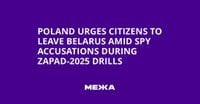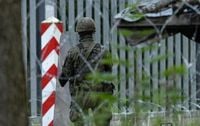Poland and Belarus are once again at the center of a diplomatic storm, this time ignited by the arrest of a young Polish monk accused of espionage just days before a major Russian-Belarusian military exercise. The incident, which unfolded in early September 2025, has not only heightened tensions between Warsaw and Minsk but also prompted a sweeping travel warning for Polish citizens in Belarus, underscoring the fragility of regional security as the Zapad-2025 drills approach.
According to Belarusian state media reports, the saga began with the detention of 27-year-old Grzegorz Havel in the town of Lepel, Vitebsk Region. Havel, identified as a Polish citizen and a Catholic monk affiliated with the Carmelite order, was apprehended by the Belarusian State Security Committee (KGB) while allegedly collecting classified documents related to the Zapad-2025 joint military exercises. Footage of the arrest, broadcast on First Information State TV in Belarus, showed Havel inside a vehicle, with purported secret materials discovered just minutes before his detention. In a carefully edited exchange, a KGB officer questioned Havel in broken Polish about his intentions, and Havel appeared to reply that he had been tasked with gathering information on the Zapad exercises.
Belarusian authorities further claimed that Havel had approached a Belarusian citizen online, offering cooperation "in the interests of the Polish special services" for monetary compensation. The official narrative was clear: Havel was a spy on a mission to collect sensitive military data, just as Russia and Belarus prepared for their largest joint war games of the year. The Zapad-2025 drills, scheduled for September 12 to 16, have long been a source of anxiety for NATO member states, given their scale and the proximity to the alliance’s eastern borders.
Yet, as quickly as Minsk painted Havel as a foreign agent, the story unraveled under scrutiny from independent Belarusian portal Zerkalo and Polish officials. Zerkalo’s investigation found that Havel was far from a typical intelligence operative. Instead, he was a deeply religious Catholic monk, academically accomplished in religious studies, and residing in Krakow. The optics of a monk being accused of espionage immediately raised eyebrows in Warsaw, where officials and commentators questioned the credibility of Belarusian claims. As Jacek Dobrzyński, spokesman for Poland’s special services coordinator, bluntly put it: "Polish special services do not use monks to collect information about military exercises." He dismissed the incident as "another provocation orchestrated by the Lukashenko regime."
The Polish government’s response was swift and unequivocal. Foreign Minister Radosław Sikorski reminded the public of the Belarusian regime’s track record, noting, "We know what kind of regime this is and what to expect from it. There are already Polish citizens in Lukashenko’s prisons, including journalist Andrzej Poczobut. We are already holding internal government consultations on how to respond to this case. I am convinced that this question will not remain unanswered." Sikorski’s comments reflected a broader consensus in Warsaw: the arrest was not just a legal matter, but a calculated political provocation aimed at destabilizing Poland and its standing in the region.
On September 6, the Polish Ministry of Foreign Affairs took the extraordinary step of urging all Polish citizens to immediately leave Belarus and to avoid travel there altogether. Ministry spokesman Paweł Wroński delivered a stark warning: "The Ministry of Foreign Affairs strongly advises against traveling to the territory of Belarus. Polish citizens may encounter events there that will not be favorable for them. This nation is not a democratic country; it is also not a country friendly to the Republic of Poland." Wroński emphasized that Poland would provide support to Havel and described the detention as "an obvious provocation, intended to destabilize the situation in Poland and to strengthen [Belarus’s] image in Ukraine."
Meanwhile, Belarusian authorities doubled down on their narrative. The Foreign Ministry in Minsk summoned Poland’s chargé d’affaires ad interim, Krzysztof Ożanna, to deliver a formal protest and accused Warsaw of violating good-neighborly relations. A strongly worded statement warned Poland against actions that could harm Belarusian national security and urged a return to "civilized dialogue." Officials indicated that a legal evaluation of Havel’s actions was underway, hinting at possible criminal proceedings.
For many observers, the timing of Havel’s arrest is no coincidence. With Zapad-2025 looming, the incident fits a familiar pattern of politically charged arrests and information campaigns designed to project vigilance against foreign threats. The drills themselves, which began with the arrival of Russian troops and equipment on August 6, are officially intended to assess the region’s security capabilities and repel potential aggression. However, Ukrainian officials have expressed concern that Russia could use the exercises as a pretext for more aggressive moves in the region, with Commander-in-Chief Oleksandr Syrskyi warning of the possible formation of covert offensive forces in Belarus.
The international community has watched the unfolding drama with mounting concern. The Polish government reiterated its commitment to protecting its citizens abroad, while experts and commentators underscored the broader implications of the case. The detention of a Catholic monk—especially one with no apparent ties to intelligence work—has been widely interpreted as a tool of destabilization and a means to amplify narratives of external hostility. According to independent reporting and Polish sources, Havel had been staying with a priest friend at the time of his detention, further casting doubt on the espionage allegations.
In Poland, the arrest has inflamed public opinion and fueled calls for a robust response. The government’s travel advisory was echoed across Polish media, with warnings that Belarus is not only undemocratic but also actively hostile toward Poland. The incident has also reignited debate about the safety of Polish citizens in neighboring authoritarian states and the risks posed by ongoing military tensions in Eastern Europe.
As the Zapad-2025 exercises draw near, the fate of Grzegorz Havel remains uncertain. What is clear, however, is that his detention has become a symbol of the increasingly adversarial relationship between Poland and Belarus—a relationship shaped by political theater, information warfare, and the ever-present shadow of Russian influence. The coming days will test not only the resolve of Polish authorities but also the resilience of regional diplomacy as both sides brace for the next move in a high-stakes geopolitical chess game.
With each new development, the case of the detained monk serves as a reminder of how quickly a single incident can escalate into a full-blown crisis, especially in a region where history, politics, and security are so tightly intertwined.


